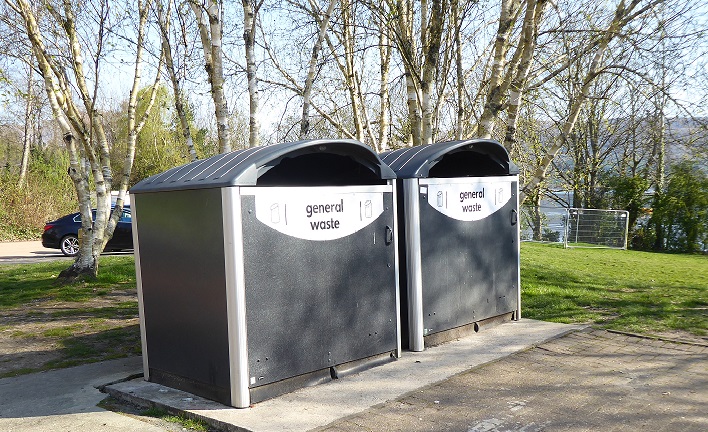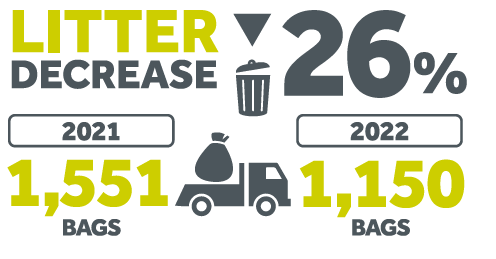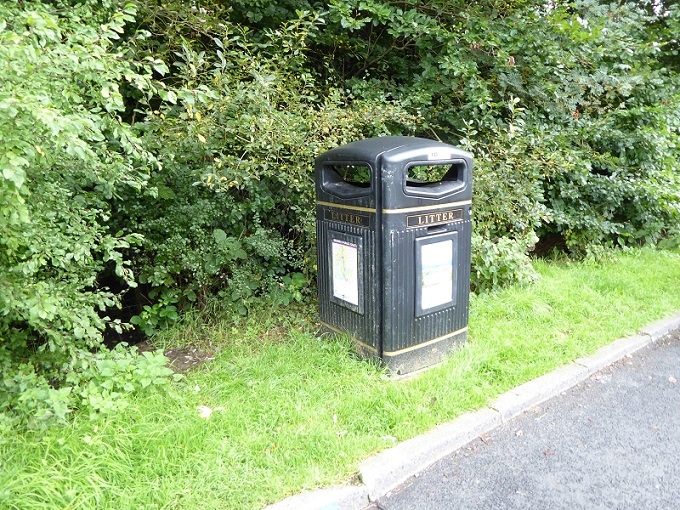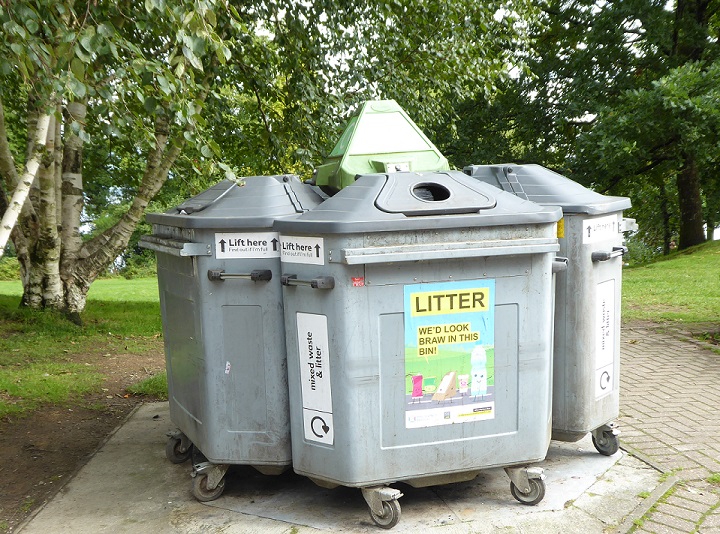
The Loch Lomond and Trossachs National Park Authority (LLTNPA) draft National Park Partnership Plan (NPPP), currently out for consultation (see here) says hardly anything about litter prevention or management and contains just one commitment that mentions litter:
“Jointly plan visitor management with partners to ensure a co-ordinated approach to staff presence on the ground, litter management, visitor information campaigns and operation of publicly managed visitor facilities.”
This is effectively meaningless and a step back from the current NPPP (2018-23) which treated litter prevention as a priority and made a commitment to:
“Strengthening efforts to prevent and manage litter more effectively at popular visitor sites and routes, and address marine litter issues on Loch Long.”
In this the LLTNPA has almost completely failed, as evidenced in my recent post on the marine litter at the head of Loch Long (see here). Instead, however, of reviewing the reasons for this failure and using that analysis to inform a revised approach, it appears the Senior Management Team at the LLTNPA would prefer to move on to other matters and abandon basics. The public and any organisation that cares about the National Park should not let them get away with this.
Where now for the LLTNPA Litter Prevention Strategy 2020-23?
At the start of 2019, in response to public criticisms of their failure to address the litter problem in the National Park, the LLTNPA appointed a new litter prevention manager on a £40k salary (see here). One outcome was a Litter Prevention Strategy which was approved by the LLTNPA Board in September 2020 (see here). Under heading 1.2, “National Park Authority: committed to tackling litter” the strategy stated:
“The National Park Authority’s fundamental aims are outlined within the National Parks (Scotland) Act 2000, which guide all of the work we undertake. The first aim is to ‘conserve and enhance the natural and cultural heritage of the area’. We see litter as a direct threat to this: litter damages natural habitats, negatively affects people’s experience of the landscape and needlessly diverts resources away from other conservation activities.”
Quite! So why is litter no longer a priority in the draft new NPPP?
Part of the answer is that a year ago the LLTNPA decided to abolish the Litter Prevention Manager position, on the basis that it was a three year post, and move the person concerned to a new post of “Behaviour Change Manager”. This was despite the report to the Board about what the post had achieved stating that Covid had had a significant impact on the Park’s litter prevention plans and that litter problems had increased during the pandemic! A more rational recommendation would have been to increase the resources devoted to litter prevention.
One effect of the decision is that there now appears to be no-one in the LLTNPA who is responsible for ensuring that adequate litter collection infrastructure is in place across the National Park. The “Visitor Management Season Review” (see here), approved by the LLTNPA Board in December 2022, showed that litter is still a major issue:  Litter may have decreased from the exceptional levels of 2021 but there was still a lot of it. Strangely, the report failed to mention the positive impact of the litter bins that had been installed in 20 laybys on the A82 along the west shore of Loch Lomond, on the initiative of the Friends of Loch Lomond and Trossachs:
Litter may have decreased from the exceptional levels of 2021 but there was still a lot of it. Strangely, the report failed to mention the positive impact of the litter bins that had been installed in 20 laybys on the A82 along the west shore of Loch Lomond, on the initiative of the Friends of Loch Lomond and Trossachs:

As anyone who has travelled along the A82 will know, the provision of litter bins has led to a significant reduction in the amount of litter discarded in the laybys and alongside the road, a massive improvement in the “visitor experience”. No longer does travelling down this section of the A82 feel like you are entering a rubbish tip.
Had the LLTNPA mentioned the project in the report, however, they would not only have risked exposing their own failure to address the issue, they might have also risked having to pick up the tab for the project which is still hanging on a shoogly peg (see here). This gets to the core of the reason for the changed approach to litter in the new draft NPPP: the LLTNPA are determined to reduce the amount of money they spend on prevention and to avoid making any new commitments. This is a major mistake and the consequences are predictable, more rubbish!
Pulling the rug from under Lorna Slater, the Minister responsible for National Parks
Lorna Slater is not just responsible for the LLTNPA, she is also the Scottish Government Minister responsible for the circular economy and the National Litter and Flytipping Strategy launched earlier this week (see here).

One wonders whether Ms Slater is aware that the LLTNPA used to provide recycling facilities on all the sites it owned but these have now been replaced by large generic black bins? Perhaps the LLTNPA saw the Deposit Return Scheme, whose flaws originated well before Lorna Slater became the responsible minister, as a good excuse to stop recycling?

The commitment made in the Litter Prevention Strategy just three years ago, “Where we have bins, we will endeavour to promote and support recycling when appropriate”, appears to have been completely abandoned.
It would appear the LLTNPA sees recycling as just too expensive/too much bother and no longer has any interest in playing its part in developing the circular economy. This exposes its claims in the new draft NPPP that it wishes to achieve net zero for what they are, a charade.
The LLTNPA is also out of step with their responsible Minister on litter prevention. The new Scottish Government Litter Strategy states “enforcement will be a key theme, and the Strategy sets out our robust commitments, including raising fixed penalty notices for flytipping to £500 and exploring the possibility of raising these to £1000.” Interestingly, the Marine Litter Strategy launched last September explicitly mentioned that the “Scottish Government had created powers for Loch Lomond and The Trossachs National Park to issue fixed penalties for littering and flytipping.” It is reasonable to conclude therefore that the Scottish Government has high expectations of the LLTNPA when it comes to litter enforcement. I was even more interested to read this information response (see here), published by the LLTNPA in February 2022: it reveals that the LLTNPA issued not a single Fixed Penalty Notice for litter in the years 2019, 2020 and 2021. Lorna Slater take note!
What needs to happen
The LLTNPA needs to make a commitment in its new NPPP to revising its Litter Prevention Strategy instead of trying to abandon it, like it has done with its Outdoor Recreation Plan (see here). That strategy needs to be based on a proper analysis of the issues and then set out the actions that are needed to address these. Consideration of how to address the marine litter problem on Loch Long and how to provide a permanent solution to the litter problems along the A82, along with a firm investment plan involving all public authorities, would be a good place to start.
Two aspects to this;
We see the usual approach, employing managers to produce strategies instead of numbers of workers to remove rubbish for the same outlay.
The “recycling” bins thing is irrelevant. The separate ones probably all went in the same truck anyway. This is inevitable as sorting at the point of deposit doesn’t work. The categories are arcane, inconsistent across authorities and incompatible with the reality of how things are packaged for practical, mainly food safety, reasons. The basic principle of user sorted waste is wrong and more concerned with the usual behavioural psychology which pervades “green” thinking i.e. getting the populace directly involved in “doing the right thing” for ideological reasons. As usual this works to the detriment of the supposed aim. The way to do it, assuming it really makes economic and environmental sense in the first place which is doubtful, is to collect it indiscriminately which immediately cuts vehicle movements and transport costs, then sort it on an industrial scale using automation as far as possible. Where waste is required to be washed this can be done using recycled process water not domestic drinking water washing raw food into the sewerage system.
This eliminates the problems of expecting the public for example to be able to tell one type of plastic from another, inevitable contamination due to lack of knowledge or simple non co operation and other issues, but does not require enforced behavioural change which is the real object.
This is a fair point but there is nothing to suggest that the LLTNPA changed their approach because of such arguments
I suggest that if they did in fact change anything other than in effect the labels on the bins, it was simply to reflect the reality of the situation. If it means they are now being emptied by one vehicle rather than three this is a step forward for common sense.
How surprising that a Scottish Government strategy once again majors on enforcement and big fines, which the major offenders if they can even be identified simply won’t pay.
Great idea bins along A82, better idea if they were emptied daily then spillage would not occur.
My understanding was the bins are emptied once a week, the collections paid for by the grant the Friends of Loch Lomond and Trossachs received but they have just confirmed that for the summer (from tomorrow) ENVA will be going on to ‘peak season’ twice a week collections on Fridays and Mondays. This is because they know that at busy periods the bins fill more quickly than once a week although I am not sure there is any evidence that they fill up in a day. The problem, however, is that money for more frequent collections is limited. This problem could be addresse if Argyll and Bute Council, whose lorries collect domestic waste, and the LLTNPA – who I understand pay for separate collections for their bins – started working together for the public good.
Look at other areas,bins emptied daily,no mess. Bins emptied less frequently,mess all over the place,what do we require? Mess or no mess?